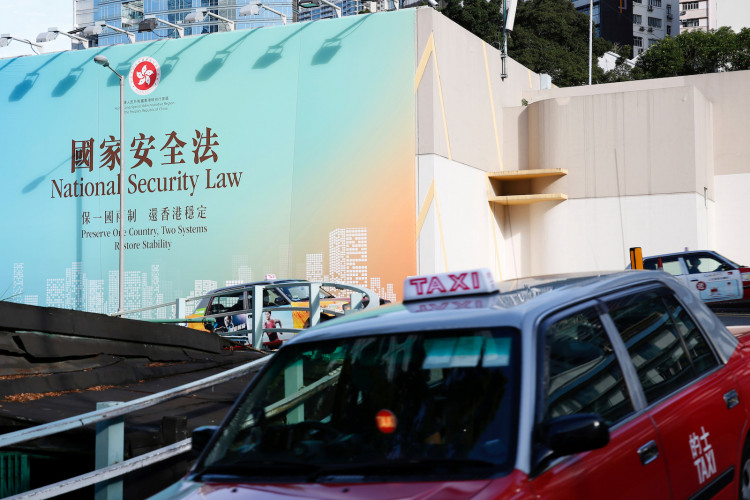The National People's Congress Standing Committee (NPCSC), an arm of China's Communist Party-run legislature, passed on Tuesday a New National Security Law that takes effect on July 1 in the Hong Kong Special Administrative Region (HKSAR).
The NPCSC had discussed the measure during two separate sessions in June and passed the legislation after its latest three-day session. The law outlines acts of secession, subversion, terrorism and collusion with foreign forces that are seen as endangering national security, with a maximum penalty of life in jail for anyone who violates the law. The Hong Kong legislature also passed the measure on Tuesday.
According to the 66-article law, the Central People's Government undertakes the fundamental responsibility for national security affairs related to the HKSAR, while the HKSAR undertakes the constitutional responsibility of safeguarding national security.
The law requires the HKSAR to establish a commission of safeguarding national security, the chairman of which shall be appointed by the Central People's Government.
The law provides that the Central People's Government shall establish an office of safeguarding national security in the HKSAR, with obligations to not only appraise national security situations and provide suggestions for major strategies, but also to collect and analyze intelligence information related to national security.
China To Enact First Live-Streaming Law
With the support of State Administration of Marketing Regulation and Chinese Consumer Association, the China Advertising Association recently approved legislation for regulating the live-streaming sales sector, in an attempt to prohibit falsified advertising and "click farming". It marked the first law for live-streaming business in China and will come into effect starting from July 1, 2020.
Chinese Consumer Association commented on June 29 that during the online shopping festival of June 18 they discovered a severe issue of counterfeiting in the live-streaming sales industry. Not only products were of lesser quality than the advertisement, but also the fan data on live-streaming platform was fabricated. Two more regulations related to live-streaming sales sector are expected to be issued next month.
Hainan Island Increases Duty-Free Purchases To Support Tourism
On June 29, Finance Department, General Administration of Customs and State Administration of Taxation issued a notice regarding the revision of off-shore duty-free shopping policies on the popular resort island of Hainan. It would be implemented starting from July 1.
The revised quota on duty-free purchases increased from RMB30,000 (US$ 4243 dollars) to RMB100,000 (US$14,100 dollars) per year for each person and the quantity of off-shore duty-free products increased from 38 to 45. Also the cap of RMB8,000 (US$1131 dollars) duty-free on a single product was lifted. Additionally, it qualified more business entities to offer duty-free products and to participate in Hainan's off-shore duty-free business.
China enacted this off-shore duty-free shopping policy in 2011. According to the statistics released by General Administration of Customs, as of the end of 2019, cumulative shopping trips were up to 16.31 million people while duty-free sales had totaled RMB53.8 billion (US$7.6 billion dollars).
China Transforms Foreign-trade To Face Global Economic Recession
On June 28, Chinese Premier Li Keqiang presided over a symposium where he urged efforts in stabilizing foreign trade and investment. Aside from government officials, Chinese company leaders in the sectors of household appliances, garments, medical equipment and cross-border e-commerce platforms participated. The forum members reported on their online import-and-export business scenarios under the global Covid-19 pandemic.
Premier Li Keqiang stressed making measures to secure labor-intensive companies and small- and medium-sized enterprises. He encouraged foreign-trading enterprises to transform and upgrade their business in terms of enhancing the quality of export products and the development of cross-border e-commerce.
Customs' Cross-Border E-commerce Management Platform showed that in the Q1 of 2020, the total volume of import and export trade increased 34.7% year-on-year. Single volume of trading in Europe has risen seven times compared to Q3 and Q4 of last year.
Following the symposium, more than ten regions including Ningbo (Zhejiang province), Xi'an (Shanxi province), Yueyang (Hunan province) and Huangshan (Anhui province) have hosted small-scale symposiums to tackle the predicaments faced by their local foreign-trade enterprises.
Shandong Province Lags Behind In Economic Growth, Citing Outflow Migration
Chinese Business Network (CBN) recently released an analysis of population movement in Guangdong, Jiangsu, Shandong and Zhejiang, the four provinces with the highest aggregate economic volume in China.
From 2017 to 2019, a total of 2.36 million people migrated to Guangdong province and 1.65 million people migrated to Zhejiang province. The city of Hangzhou absorbed 550,000 people in 2019, which was the first time it surpassed the city of Shenzhen, which borders Hong Kong, as the top migration destination. In contrast, more than 1.06 million people have migrated from Shandong province in the last six years.
Shandong became the province with highest loss to population migration. The report uncovered that young labor force take a major part of Shandong's loss. Resource-based industries such as mechanics, textile and metallurgy in Shandong province are less attractive to young laborers than the high-tech industry gathered in Guangdong and Zhejiang provinces.
With young workers fleeing the province, it saw the highest aging rate of 15.77%. By the end of 2019, Shandong's aggregate economic volume was only 66% that of Guangdong province and 71.3% of Jiangsu province. Also the revenue in Zhejiang province exceeded that of Shandong province by RMB50 billion (US$7 billion dollars).





